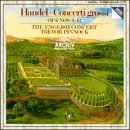| All Artists: Handel, Pinnock, English Concert Title: Concerti Grossi Op 6, 9-12 Members Wishing: 0 Total Copies: 0 Label: Polygram Records Release Date: 10/25/1990 Genre: Classical Styles: Forms & Genres, Concertos, Historical Periods, Baroque (c.1600-1750) Number of Discs: 1 SwapaCD Credits: 1 UPC: 028941089922 |
Search - Handel, Pinnock, English Concert :: Concerti Grossi Op 6, 9-12
 | Handel, Pinnock, English Concert Concerti Grossi Op 6, 9-12 Genre: Classical
|
Larger Image |
CD Details |
CD ReviewsA Key Handel Recording Ray | 08/02/2007 (5 out of 5 stars) "Handel's Concerti Grossi opus 6 must surely be ranked as some of the greatest orchestral music ever composed. Probably penned in or around 1739, the pieces were developed to serve as orchestral "interludes" for other operatic or oratorio performances. To listen to them, however, is to tempt us not believe that this could possibly be the case: the Concerti Grossi opus 6 works are without doubt among the pinnacle of Baroque composition. After listening to these, we are left with a distinct sadness that Handel did not turn his attention more to this genre, as his masterful treatment in the opus 6 shows us his true genius.
There are a total of 12 concerti, each in four-part form, with contrasting tempo from part to part. There are also strong counterpoint forms present: individual instruments "answer" the orchestra, and vice versa, throughout the entire series. There are also strong melodic lines, and even though we never forget we are listening to Baroque music, the presence of relatively strong themes perhaps presages Beethoven or Mozart to some degree. The playing is sprightly, crisp, and precise, but never lacking in sonority or forcefulness. Tempo is kept up, and the beautiful strains of Baroque composition are present at every turn. There are a number of different recordings of the Concerti Grossi opus 6, some of which are extravagantly priced, but The English Consort with Trevor Pinnock remains my personal favorite. Pinnock's recordings were originally released on the Archiv label by Deutsche Grammophon in the 1980's, a time in which there was so much activity in creating high-quality recordings of period instruments with the day's premier orchestras. This series, which consists of three separate releases (the first, of no's 1 - 4, the second of no's 5 - 8, and the third of no's 9 -12) will form a solid center of any Baroque collection due to its strong performance by Pinnock and The English Consort, as well as the excellent sonic characteristics of the DG recording. These discs can now be difficult to find, but a number are still available used, and generally at reasonable prices. The discs were about $20 EACH when first released in the 1980's, and so if you can locate some good quality used copies for under $10 per disc, it is a bargain. You may also be able to find the identical recordings issues through DG and Archiv for markets other than the US, albeit at higher prices. (The smaller opus 3 Concerti Grossi by Handel is also available on a separate disc from DG by Pinnock and the English Consort, but has also become difficult to find used, and can be exorbitantly expensive.) On a personal note, I originally acquired these pieces on vinyl records in the early 1980's, and these pieces were among the first Baroque compositions I explored as a newcomer to classical music. There couldn't have been a better choice, and I still feel that these performances are amongst the finest I have ever heard. As the 1980's unfolded, CD-ROM's became the media of choice, and being able to listen to these re-released recordings without pops and clicks was greatly rewarding. I now listen to them as WMA and ATRAC files on a computer, extending them into another technology generation. It's noteworthy to find that the Academy of Ancient Music under its new conductor, Richard Egarr (and under the Harmonia Mundi label) has started releasing a new series of Handel's works, commencing with the opus 3 pieces, and it would be wonderful to have them record the opus 6 works, as well. But even if they do (and I indeed hope they will), that undertaking will not replace these key Pinnock recordings. They remain classics, and will likely be so when the next technology is unleashed upon us. " |

 Track Listings (21) - Disc #1
Track Listings (21) - Disc #1